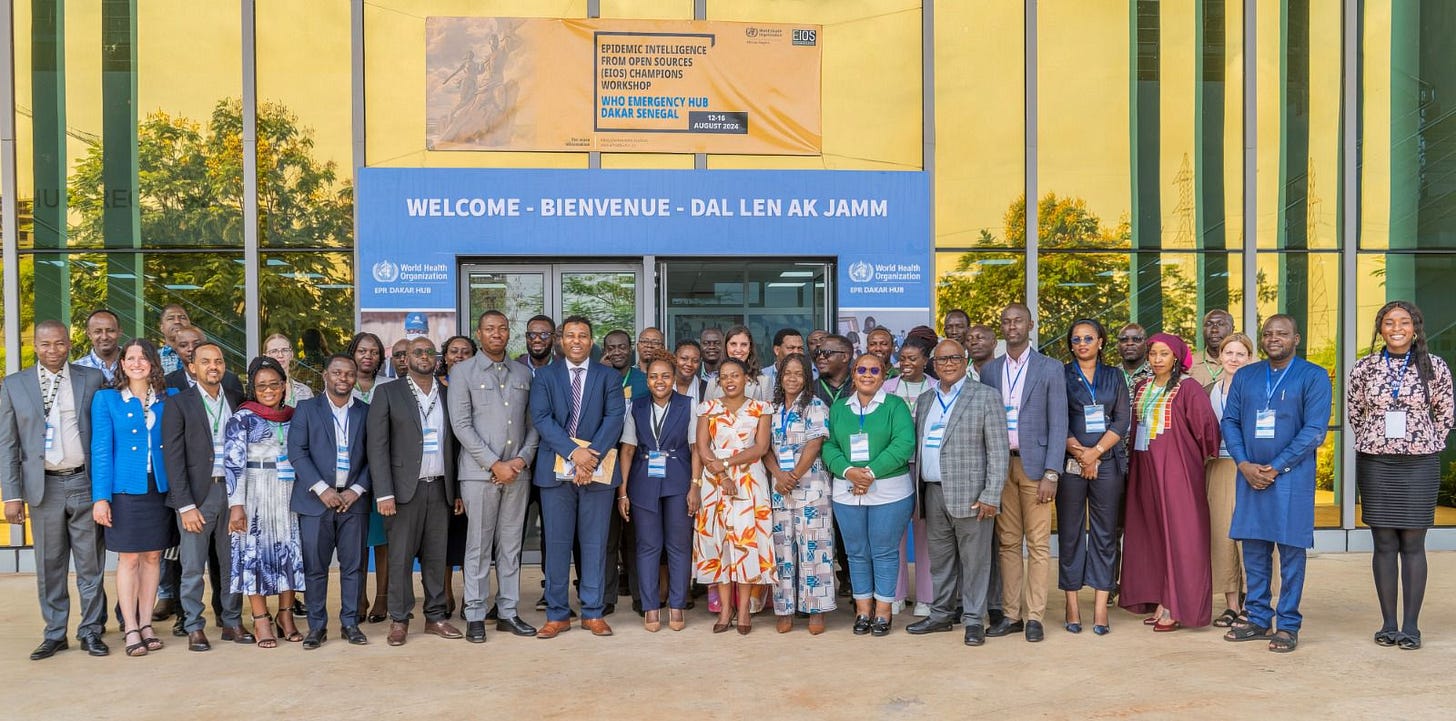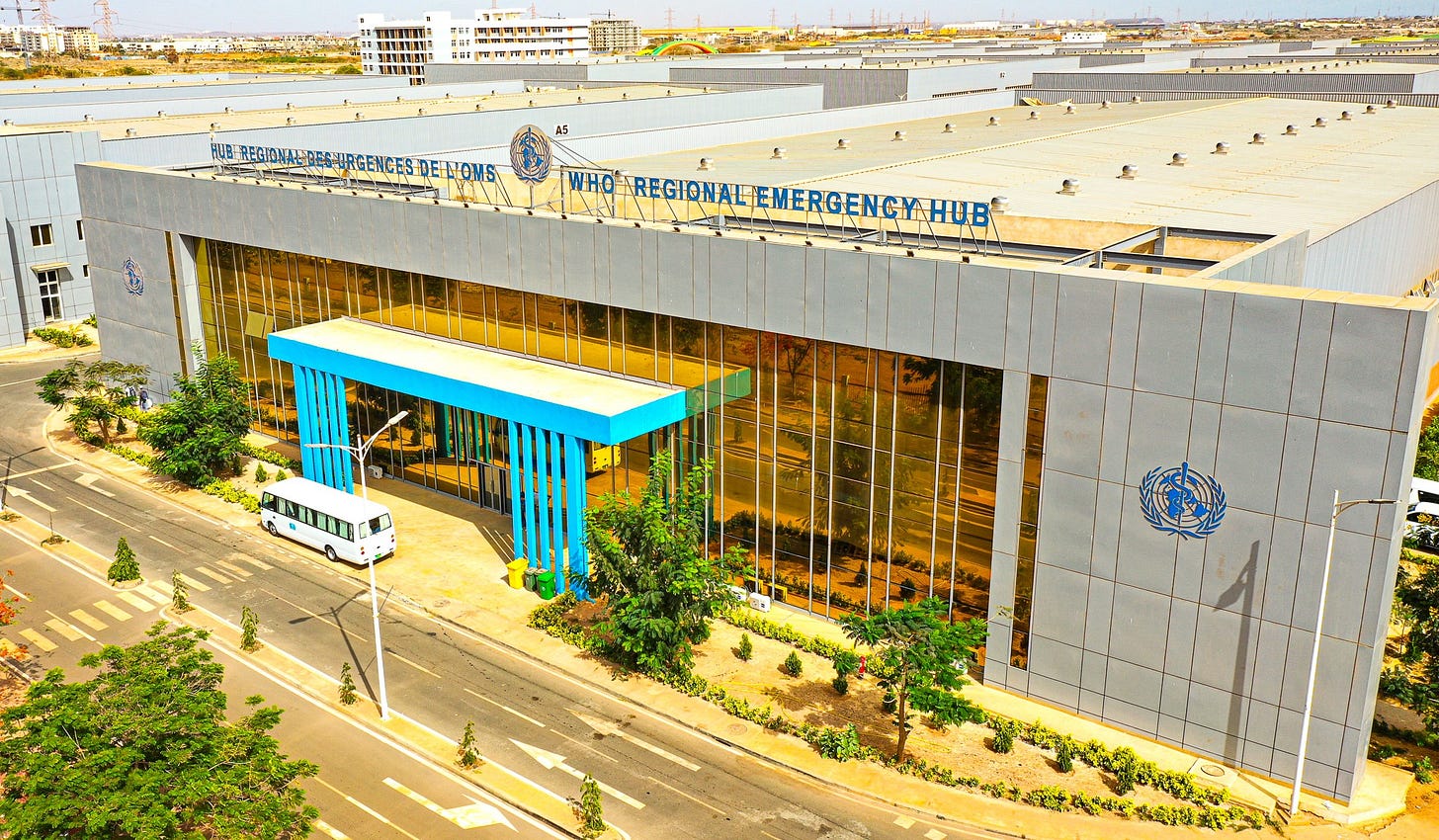Dear EIOS Community Member,
We are thrilled to announce that over 100 Member States have now joined the EIOS initiative, becoming part of our growing community of practice! This milestone highlights the unwavering dedication of our members to strengthen public health intelligence worldwide and we are deeply honored and humbled by our collective achievements to date. With EIOS V 2.0 on the horizon, we are excited to bring you even stronger tools for your essential work in global health intelligence. Together, we are building a network that adapts, grows, and thrives in the face of change.
Expanding the EIOS Community: Welcoming Our Newest Members
In the second half of 2024, we welcomed 11 new Member States to the EIOS community of practice: Cabo Verde, Burundi, Brunei Darussalam, Kuwait, Madagascar, Malaysia, Mauritius, Mozambique, occupied Palestinian territory, Peru and Serbia. We are excited to to have our new members on board and look forward to working together to strengthen global public health intelligence.
EIOS System Updates
As you may have already heard, we are working on a new version of the EIOS system to improve performance and better support the important work that you do. Here is a short update on what you can expect during the v.2.0 release and rollout.
What is changing?
What we lovingly refer to as EIOS v.2.0, will introduce new and enhanced features to provide an improved user experience. These include:
New, multilingual user interface, with a refreshed look and feel
Enhanced board management, including ability to filter and search
Introduction of a harmonized category taxonomy across all communities
Ability to share boards across communities for improved collaboration
Improved creation and management of communications
Enhanced user management and role-based permissions
What is next?
We will ensure that you are well supported in transitioning to the new EIOS v.2.0 system in mid-2025, to make the change as smooth as possible with minimal disruptions to your work. This preparation includes:
User Acceptance Testing (UAT) will provide an opportunity for invited participants to test specific system features and provide feedback to ensure that the first release works as it should and meets users' needs.
Documentation and training material will be revised and available through an improved online portal. Webinars and extensive drop-in clinic hours will further help users get familiar with the use of the new system, which will be available for use before transition.
We will provide step-by-step guidance to ensure a smooth rollout and transition to EIOS v.2.0, whilst v.1 will continue to be available for a period to reduce any potential disruption.
We will continue to keep you up to date with timely information on our progress with our partners at the Joint Research Centre (JRC) and Adappt, and with gracious support from the European Commission's Health Emergency Preparedness and Response Authority (HERA). If you have any questions in the meantime, please send these to eios@who.int. We look forward to sharing the new system with you!
Building Global Capacity: The 2024 EIOS ToT
The fourth edition of the EIOS Training of Trainers (ToT) was conducted in September 2024 at the WHO Hub for Pandemic and Epidemic Intelligence in Berlin, bringing together more than 30 participants from Member States, partner organizations, as well as from national, regional and global levels of WHO. The workshop focused on equipping participants with skills to deliver consistent training on the EIOS system and Public Health Intelligence - essential components of the EIOS initiative’s capacity-building and sustainability strategies. The newly trained experts have now joined the Global EIOS Training Team, a platform for exchanging training capacity, strategies and experiences. For more information around EIOS trainings, please visit our website!

Updates from the EIOS Community
EIOS Champions’ Workshops in Africa
The WHO AFRO EIOS team hosted their inaugural EIOS Champions’ workshops at the WHO Emergency Hub in Dakar in August and October 2024. These two 5-day workshops, one gathering representatives from English-speaking and the other from francophone countries in Africa, aimed to create and strengthen a network of experts who can promote and support EIOS system implementation as part of their public health intelligence activities within their countries and across the region.
The workshops included leaders and technical experts from Ministries of Health/National Public Health Agencies and WHO Country Offices in Africa. They were supported by other key stakeholders and partners, including Africa CDC, the World Organisation for Animal Health (WOAH), as well as experts from WHO EMRO and the EIOS Core Team. Through hands-on sessions, participants strengthened their skills in using the EIOS system, as well as training others on its core functions, including health threat monitoring and communication. The exchange of experiences and best practices played a central part in both workshops, some of which were shared through live-streamed webinars and round table discussions with the global EIOS community. Participants established valuable connections within and across their respective sub-regions and created a strategic roadmap to optimize EIOS system use across Africa to advance public health intelligence and resilience on the continent.

Enhancing One Health Surveillance through EIOS: Insights from WOAH
One Health Intelligence (GLEWS+): The Food and Agriculture Organization of the United Nations (FAO), the World Organization for Animal Health (WOAH) and WHO have finalized the business rules and technical documents needed to develop an improved version of the Global Early Warning System GLEWS+. There are plans for the EIOS system to be integrated into GLEWS+ in the future, to facilitate zoonotic disease rumor tracking and information sharing within a One Health context.
Supporting Early Warning in the Asia-Pacific Region: WOAH is working to expand the use and implementation of EIOS in the Asia-Pacific region. An analysis has been conducted to assess gaps in the current coverage of categories and sources of animal health threats, and actions are being taken to address these. To monitor and further improve the EIOS system’s sensitivity and the ability of the Asia-Pacific Active Search Team to detect animal health threats, the team now produces an internal monthly indicator publication to assess and report on the results of EIOS system activities in the region.
PAHO’s Epidemic Intelligence Strategy and the EIOS Initiative
In December 2023, the Region of the Americas held its first regional meeting on epidemic intelligence to identify key strategic priorities at national, sub-regional, and regional levels. Subsequently, the “Strategy on Epidemic Intelligence for Strengthening Early Warning of Health Emergencies 2024-2029,” a Member State-driven initiative proposed by Brazil and supported by all PAHO Member States, was approved by PAHO’s 61st Directing Council. It focuses on four Strategic Lines of Action with a One Health approach: 1) improving leadership and coordination, 2) developing technical capabilities, 3) promoting integration and interoperability of data and systems, and 4) fostering multi-sectoral collaboration, for which EIOS serves as a key initiative. This strategy highlights the commitment in the Americas to be better equipped for potential epidemics and increase its resilience to health emergencies.
The Countdown Begins: 2024 EIOS GTM
We are just a few weeks away from the highly anticipated 2024 EIOS Global Technical Meeting (GTM)! Co-hosted by the WHO Regional Office for Africa with support from the Health Emergency Preparedness and Response Authority (HERA) of the European Commission, this year’s GTM will put a spotlight on “The Future of Public Health Intelligence.”
Over three dynamic days, participants will delve into the latest advancements of the EIOS initiative and broader PHI implementation at both national and global levels, explore the transformative potential of Artificial Intelligence in public health, and discover new advancements to the EIOS system. This in-person meeting will also explore future preparedness, focusing on strategies to strengthen the PHI workforce and enhance health systems’ readiness for emerging global threats. We look forward to welcoming many dear members of the global EIOS community in Senegal shortly!

COMMUNITY CLOSE-UP
Name of Community: Republic of Korea (RoK)
Active on EIOS since: November 2019
Number of members: 18
How many different entities are represented in your community?
There is currently one entity in the RoK community, comprised of two divisions: the Emergency Operation Center, and the Division of Disease Surveillance Strategy. Both of them are parts of the Korea Disease Control and Prevention Agency (KDCA)
What do you use EIOS for?
The KDCA leverages the EIOS system to enhance PHI surveillance, monitoring and reporting on diverse infectious disease occurrences globally through dedicated boards that are updated daily. Furthermore, by adapting the EIOS dashboard to align with domestic needs, the KDCA visually presents infectious disease trends relevant to the local context.
What do you like best about EIOS?
The EIOS system allows real-time, easy access to infectious disease outbreak information from various sources on a single platform, anytime and anywhere. Rapid initial risk assessments help prevent potential future infectious disease incidents. Additionally, active feedback from our community members enables continuous system improvement and development.
With best regards,
The EIOS Core Team




